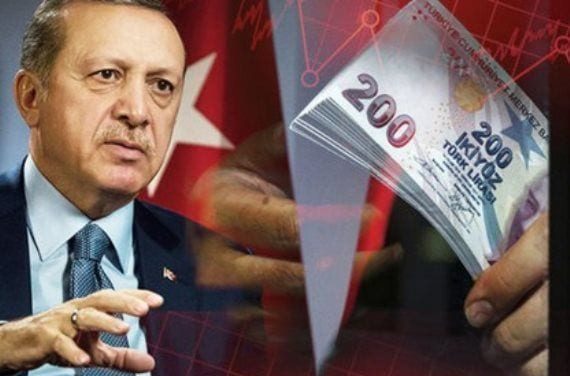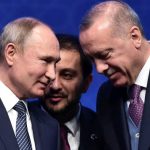It’s a distress message for m.v. ‘Turkey Democracy’. But it’s neither from the captain, President Recep Tayyip Erdogan, nor members of the crew, Justice and Development Party (AKP) and key leader of the ally Nationalist Movement Party (MHP) Devlet Bahçeli. It’s from an independent global ‘watch tug’ on corruption, abuse of human rights and democratic decline – the Transparency International (T.I.) — in its 2021 corruption perceptions index (CPI) report covering 180 countries.
T.I. Secretariat Chief Executive Officer, Daniel Eriksson, observes: “Corruption enables both human rights abuses and democratic decline.” He goes on: “In turn, these factors lead to higher levels of corruption, setting off a vicious circle.” He then pleads with and cautions the world: “There is an urgent need to accelerate the fight against corruption, if we are to halt human rights abuses and democratic decline across the globe.”
On the whole, the report reveals that “corruption levels have stagnated worldwide at a time when human rights and democracy are also under attack… More corrupt regimes tend to deliberately suppress the civil and political rights of their citizens, and when these rights are weak, people are less able to tackle corruption.”
It also shows “a stark correlation between corrupt regimes and the murder of human rights defenders”, giving an example of “98 per cent of the hundreds of human rights defenders murdered in 2020, taking place in the 23 countries with high levels of public sector corruption – or a CPI score below 45.” The score of more than two-thirds of countries (68 per cent) is below 50 when the average global score remains static at 43 out of 100. “Since 2012, 25 countries significantly improved their scores, but in the same period 23 countries significantly declined.”
Downloading this on the Republic of Turkey, what does one establish? The country’s score is 38, which is the same for Argentina, Brazil, Indonesia, Lesotho and Serbia. This is 12 points below 50 and seven below the world average of 43. For this score, Turkey has taken the 86th slot out of 180 countries. It is among the worse half set of countries on the level of public sector corruption, human rights abuses and democratic decline. Turkey is among 27 countries with the lowest CPI score they had achieved since the earliest comparable year of available data in 2012. Usually, a score below 50 indicates serious levels of public sector corruption.
Could Eriksson’s warning about the corruption, human rights abuse and democratic decline vicious circle apply to contemporary Turkey? Or maybe, could Turkey have already been (plunged) there by the governance behaviour of its leaders so that what the world should be expecting to experience is cycles of the vicious circle in operation?
From a variety of literary works, a vicious circle is described as “a problem or difficult situation that has the effect of creating new problems that then cause the original problem or situation to occur again.” Along the Romans’ “causa est non causa causati” principle, for Eriksson’s corruption, human rights abuses and democratic decline vicious circle to evolve, there have to be vicious people – people who do brutal things on purpose and out of ill-will towards others. In other words, there have to be people having the quality of vice or immorality and depravity — evil that is.
What is the situation in Turkey? Could the country be a typical case of the Eriksson’s observation? Consider the following scenarios.
Scenario One: By coincidence, 2012, which is given by Transparency International as the earliest year of available data, has a lot of meaning about Turkish affairs. This is around the time – December 17-25, 2013 to be exact– when investigations established a grand official corruption involving the then Prime Minister and now President Recep Tayyip Erdogan, the ruling Justice and Development Party (AKP) and close family members. Four ministers resigned and, of late, one of them has confessed that reports about his part in the bribery and corruption scam were true.
Scenario Two: The grand corruption revelation is taken as having anti-government motives engineered by Fethullah Gulen, who is also accused of planting his people across the board in the civil and military services. Purges begin. Public prosecutors, servicemen and women, teachers, doctors, judges taken to be sympathetic to Gulen are dismissed on Erdogan decrees. Lucky ones flee the country. The unlucky are detained, arrested, prosecuted and jailed. The most unlucky get persecuted in the process as well.
Mechanisms of checks and balances are paralyzed going against provisions of the national constitution and international agreements to which Turkey is party. The judiciary loses its independence, objectivity, impartiality and self-governance. The tenure of judges guaranteed in the constitution is terminated. Within hours of the planned-to-fail attempted coup of July 15, 2016. 4,238 judges and prosecutors are fired. Slowly, Erdogan takes over the control of the High Council of Judges and Prosecutors. The judiciary becomes the tool of the executive.
All these were mere pretexts. A prosecutor at the Istanbul Court House was quoted in August, 2014, as telling a journalist that if necessary 500,000 people could be taken into custody in a witch-hunt. Interior Minister Suleyman Soylu confirmed this in February 2019 when he announced that more than 500,000 people had been detained over alleged links with the Gulen movement. Separately, Defense Ministry announced 15,253 military officers, including 150 generals and admirals, as having been dismissed.
Labour unions (19) were shut down, their assets confiscated while their management and members faced arrests and detention. The Turkish Confederation of Businessmen and Industrialists (TUSKON) grouping 211 business associations was shut down and many of its members were arrested and their assets seized. The media is completely paralyzed by government take-over, put under the management and ownership of pro-state entities, detaining, arresting, jailing and persecuting journalists.
Scenario Three: The executive is playing solo in the absence of an independent, objective, impartial and self-governing judiciary, legislature, civil society and the media. It can commit any wrong with impunity at home and abroad because all checks and balances are out of place.
Vices become virtuous; creating fertile ground for all sorts of further government blessed or ignored crimes and injustices. Wider gates are open for bribery and corruption. And the vicious circle warned against by the T.I. Secretariat CEO Eriksson has been set off. How else does one explain the situation whereby a minister for interior receives ruling party mayors convicted of rigging tenders?
Has Turkey not actually been there already? That is the question with live answers. Rights required to hold power to account are gone along with institutional checks and access to government spending. This is complicated by the country appearing on a transnational corruption map involving drug trafficking, money laundering, cross border kidnappings and murder of political opponents.
The country has indeed been plunged in the corruption, human rights abuses and democratic decline vicious circle. All fugal forces are eminent from what has been taking place on the ground. The problem is: “Where will the petal forces come from for the country to get back on track?”
By: FELIX KAIZA
Source: Poli Turco



